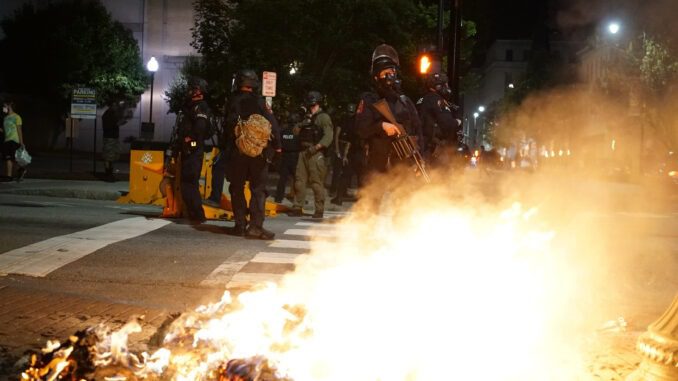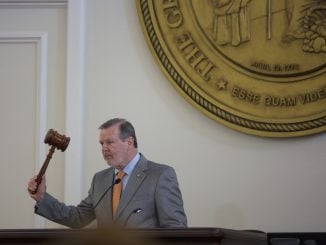
RALEIGH — 2020 was a year defined by the coronavirus pandemic, but the year was also marked by steady “ReOpen” protests over pandemic executive orders. Overlapping with ReOpen protests were Black Lives Matter demonstrations over the death of George Floyd, many of which turned violent and destructive when night fell.
Following a statewide lockdown order by Gov. Roy Cooper in March, citizens concerned about restrictions being extended formed a Facebook group called “ReOpenNC.” What started with a few dozen members rose to around 87,000 members in the organization’s Facebook group by December. ReOpenNC co-founder Ashley Smith says the governor’s actions have been a factor in the increase in membership.
“Interestingly, every time Roy Cooper does an executive order, we get around 1,500 membership requests that day,” said Smith. “People are just fed up.”
Smith added that more and more people every day are realizing that lockdown measures just don’t work.
ReOpenNC held its first of five weekly protests in Raleigh on April 14 with a goal of reopening the state no later than May 1. That goal was not met as the phased plans have been adjusted and curtailed multiple times by Cooper.
At the April 14 protest, a female member of the group allegedly refused to disperse and was arrested for violating the governor’s executive order. The Raleigh Police Department made national headlines responding to questions about the arrest with a tweet that said, in part, “protesting is not an essential activity.” Following the tweet, Senate Judiciary Committee Co-Chairs Warren Daniel (R-Burke) and Danny Britt (R-Robeson) requested “urgent clarification” from the governor. Cooper’s office did clarify and said protesting shouldn’t be infringed upon.
Elected officials made appearances at subsequent ReOpenNC protests, including Congressman Dan Bishop (R-09).
“This group here today represents the majority of North Carolinians, and they are here to remind Roy Cooper and other officials that the Constitution isn’t suspended — it’s not under a stay-at-home order,” said Bishop, referring to the Raleigh Police’s tweet the week prior.
Throughout the protests, business owners and citizens shared stories about the impact the closures were having on their businesses and their personal lives, such as mounting bills and rent payments, missing medical treatments, being unable to attend religious services and having to choose between paying bills and buying food.
“We are not selfish. We care about others. My family is essential. At the very least, they are essential to me,” said Danny Richani, co-owner of a HotWorx Infrared Fitness Studio in Wilmington, one of over a dozen gym and fitness owners facing financial ruin.
As the state moved through Phase 2.5 and into Phase 3, most businesses were allowed to open but with many still with capacity restrictions. Bar owners called Phase 3 just as much of a “death sentence” as Phase 2. Heading into Christmas and New Year’s holidays, many bars and private clubs remain closed. Many such business can’t bring in needed revenue to offset costs under Phase 3 restrictions made worse by the governor’s 10 p.m. to 5 a.m. statewide curfew and a tightening of the curfew on the sale of alcohol.
Like ReOpenNC, the N.C. Bar and Tavern Association held peaceful protests outside the Executive Mansion asking for help, but the governor has not altered course.
Peaceful protests followed by riots
Throughout the five weeks ReOpenNC protested, the demonstrations were peaceful, but Black Lives Matter protests, starting in June following the death of George Floyd, often shifted to rioting by nightfall. Major cities in the state such as Charlotte, Fayetteville and Raleigh saw fires set, property destruction, widespread vandalism and attacks on police.
During riots that spanned two night of May 30 and 31, fires were set intentionally, storefronts were smashed, and buildings were spray-painted with Black Lives Matter graffiti and anarchist symbols. Various monuments on the state capitol ground were spray-painted as well.
During the rioting on May 30, several businesses were broken into and looted. The Dollar General had a fire set inside of it after looters broke in. Rioters also set a fire in the CVS located at the corner of Hargett Street and Fayetteville Street. As of now, the CVS remains closed and boarded up and has a “Black Lives Matter community mural” covering the Fayetteville Street side.
It wasn’t until 12:29 a.m. on Sunday morning that the governor finally commented in a single tweet which read, “I am in continuing contact with Emergency Management leaders about violence occurring in some of our cities. Frustrating that planned peaceful protests about real systemic racism are marred. I am grateful for those seeking justice peacefully.”
House Speaker Tim Moore (R-Kings Mountain) shared video footage he filmed from his cell phone and called on the governor to activate the N.C. National Guard. Cooper would not emerge again until around 4 p.m. on Sunday afternoon.
“If you’re a tattoo artist trying to reopen your business, you’ll be arrested in front of a TV camera as a ‘show of force.’ But if you burn that tattoo parlor to the ground, you’ll face no consequence,” said Senate Leader Phil Berger (R-Eden) in a statement after the second night of rioting.
Berger continued, “If you’re a group of 11 worshippers looking to pray inside your chapel, the governor will go to federal court to stop you. But if you’re a group of 100 rioters, the governor will make empty gestures about ‘encouraging’ local officials hours before you return with baseball bats to wreak havoc all over again.”
The cost of the riots that spanned from May 30 through June 2 was in the millions.
The N.C. State Highway Patrol (NCSHP) covered multiple cities and towns from May 30 through June 14 with a total cost of nearly $350,000. Raleigh was the most expensive, at $164,300. Charlotte was second, at around $71,841.
The Wake County Sheriff’s Office reported $400,000 in costs, the State Capitol Police reported $48,000, Alcohol Law Enforcement officers had $27,000 and the activation of the North Carolina National Guard members cost $725,000.
The Raleigh Police Department’s after-action report listed staggering expenditures of $1,438,450. The report also included 106 arrests, 71 reports of property damage, 53 burglary reports and number of fires set during the riots, but only six were considered arson.
Stores along Fayetteville Street in Raleigh were some of the hardest hit. Even now, in December, many stores have kept boards up over windows that were broken during the initial riots.
One merchant, Briggs Hardware, announced in July it was moving out of the city entirely and taking the store to the coast. The owner, Evelyn Briggs-Davis, criticized Raleigh Mayor Mary Ann Baldwin, Raleigh Police Chief Sandra Deck Brown and the governor for not protecting business owners downtown.
“Personally, I didn’t feel safe in Raleigh because the police were told to stand down,” said Briggs-Davis.
A month later, Briggs-Davis announced the store was moving to Emerald Isle. Briggs Hardware had been open in Raleigh for 155 years.
With this lenient response to the riots, Cooper was criticized for partisan favoritism in his harsher response to ReOpenNC demonstrations.
Over the course of his absence during the riots, the governor had apparently met with several social justice groups responsible for the initial daytime protests in Raleigh, yet he had not met with protesting business owners or members of ReOpenNC. Cooper and N.C. Health and Human Services Secretary Mandy Cohen on multiple occasions called ReOpenNC “worrisome” and “misguided.”
On June 1, shortly before the start of the 8 p.m. curfew in Raleigh, Cooper came out of the Executive Mansion and walked approximately 200-feet from one gate of the mansion to another alongside George Floyd protesters. Cooper’s walk with the protesters was brisk, and his mask dangled from one ear. Reporters and the crowd shouted questions, which he did not answer, but instead waved and smiled.
Smith said that the irony of Cooper walking in solidarity with Black Lives Matter and George Floyd protesters was not lost on members of ReOpenNC, whose protests never turned destructive or violent.
“It continues to highlight his hypocrisy,” said Smith, adding that it was not lost on people that she was arrested “on the same sidewalk that he then marched on with the other protesters just a couple of weeks later,” and did so without properly wearing a mask.
Smith and two women were arrested at the third week of protests for stepping on the sidewalk outside the mansion gates. Law enforcement had allegedly told protesters they were not allowed to use the sidewalk directly in front of the governor’s residence. All three were charged with resisting an officer and for violating the governor’s “Executive Order 117.”
Protests shift to local support
While Black Lives Matter protests and nighttime riots subsided heading into fall, ReOpenNC has continued a ground game of advocacy for businesses still struggling due to Cooper’s COVID-related orders.
Recently, ReOpenNC rallied in Wendell in support of the Wendell General Store, which had recently been targeted for non-compliant mask signage. Owner Regina Harmon, a member of ReOpenNC, said her store was targeted over a sign that did not require masks in her store. Harmon said the sign was removed, yet she was given a criminal citation for one count of “aiding and abetting the violation of an executive order.”
Heading into 2021, Smith said that her group will be rebranding in the new year and will have a new name and broader mission. She said there is “a swamp in North Carolina, and it needs to be drained here too.”
Smith also said that ReOpenNC will continue to encourage noncompliance with what Smith called “unconstitutional mandates.” She also said the group will also continue to both practice and encourage civil disobedience.


